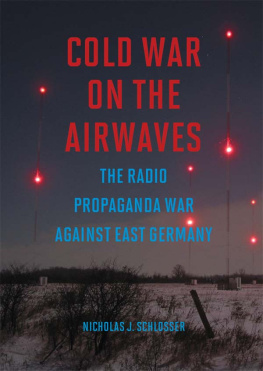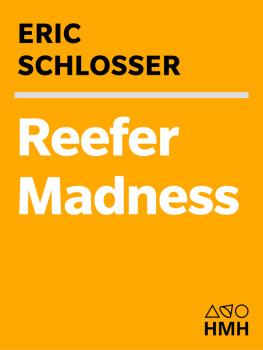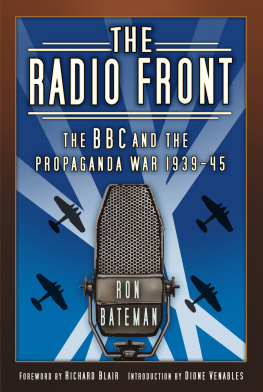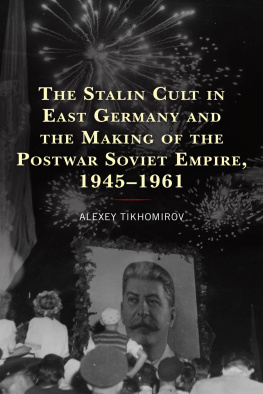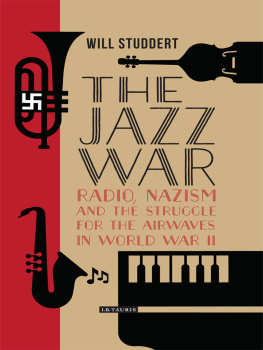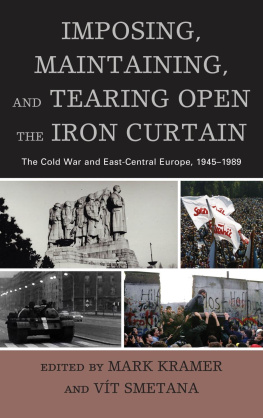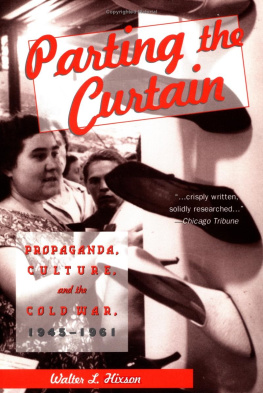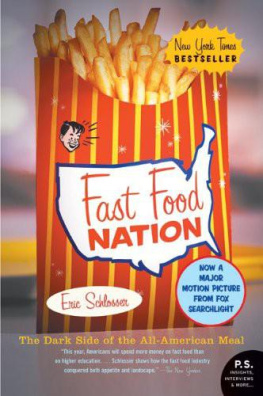ABBREVIATIONS
| AFO | Archivierte Feindobjekt-Akte (Archived Enemy Object Files) |
| BAK | Bundesarchiv Koblenz (Federal Archive, Koblenz) |
| BAB | Bundesarchiv Lichterfelde (Federal Archive, Lichterfelde) |
| BBC | British Broadcasting Corporation |
| BdL | Bro der Leitung (Leadership Office) |
| BStU | Der Bundesbeauftragte fr die Unterlagen des Staatssicherheitsdienstes der ehemaligen Deutschen Demokratischen Republik (Federal Commission for the Records of the State Security Service of the Former German Democratic Republic) |
| CIA | Central Intelligence Agency |
| DHM | Deutsches Historisches Museum (German Historical Museum) |
| DIAS | Drahtfunk im Amerikanischen Sektor (Wired Broadcasting in the American Sector) |
| DIVO | Deutsches Institut fr Volksumfragen (German Institute for Public Opinion) |
| DRA | Deutsches Rundfunkarchiv (German Radio Archive) |
| FDGB | Freier Deutscher Gewerkschaftsbund (Free German Trade Union Federation) |
| GDR | Deutsche Demokratische Republik/German Democratic Republic |
| HiCoG | Office of the United States High Commissioner for Germany |
| IEV | International Evaluation Staff |
| ICD | Information Control Division |
| ISB | Information Services Branch |
| KPD | Kommunistische Partei Deutschland (Communist Party of Germany) |
| LAB | Landesarchiv Berlin (Berlin State Archive) |
| MfS | Ministerium fr Staatssicherheit (aka Stasi) (Ministry for State Security) |
| NARA | National Archives and Records Administration, College Park |
| NDR | Norddeutsche Funk (North German Radio) |
| NWDR | Nordwestdeutscher Rundfunk (Northwest German Radio) |
| OMGUS | Office of the Military Government, United States |
| OSS | Office of Strategic Services |
| OWI | Office of War Information |
| PWD | Psychological Warfare Division |
| RFE | Radio Free Europe |
| RIAS | Rundfunk im Amerikanischen Sektor (Radio in the American Sector) |
| SAPMO | Stiftung Archiv der Parteien und Massenorganisationen der DDR im Bundesarchiv (Foundation Archive for the GDR's Parties and Mass Organizations in the Federal Archive) |
| SED | Sozialistische Einheitspartei Deutschland (Socialist Unity Party of Germany) |
| SFB | Sender Freies Berlin (Radio Free Berlin) |
| SWF | Sdwestfunk (Southwest Radio) |
| SPD | Sozialdemokratische Partei Deutschlands (Social Democratic Party of Germany) |
| SBZ | Sowjetische Besatzungszone (Soviet Occupation Zone) |
| UKW | Ultrakurzwelle (Ultra Short Wave [FM]) |
| USIA | United States Information Agency |
| USIS | United States Information Service |
| VOA | Voice of America |
| ZAIG | Zentrale Auswertungs- und Informationsgruppe (Central Assessment and Information Group) |
| ZK | Zentralkomitee (Central Committee) |

RIAS's original leadership meet with Brigadier General Frank L. Howley. From left: Program Chief Harry Frohman, Political Chief Gustav Mathieu, General Howley, and Chief Ruth Norden.
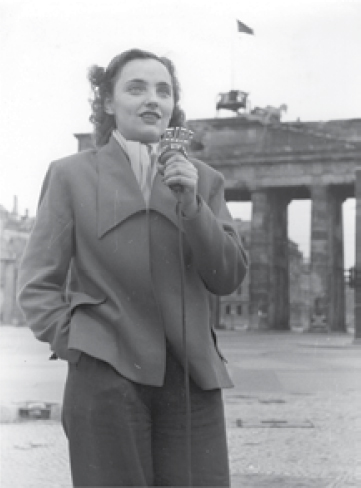
A RIAS journalist reports from the western side of the Brandenburg Gate, right at the sector border dividing East Berlin and West Berlin.

RIAS's main stationhouse in Berlin's Schneberg District.
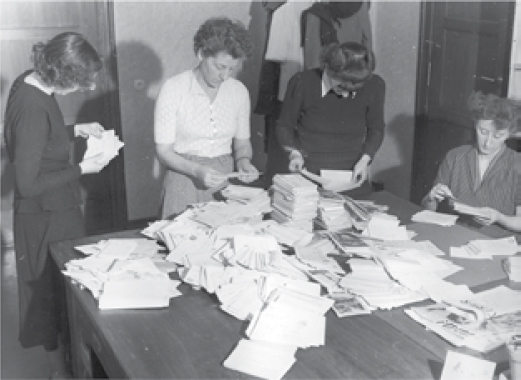
RIAS staffers sort through listener mail. RIAS treated letters as a valuable source for listener opinions and used them to build a link with its audience in East Germany.

Gordon Ewing, RIAS Director from 1953 to 1957, speaks with RIAS's Chief Editor Hans Herz. Ewing was described by a colleague as the very model of the American gentleman, tall, slender, musical and literary, always well dressed, amiable, and confident on the social and diplomatic dance floor.

A visitor is interviewed by a RIAS official. The efforts to obscure the identities of both individuals in the photograph testifies to the considerable danger faced by many who worked for RIAS and visited the station.

RIAS journalists exchange program ideas at a daily editorial conference. After observing a typical meeting such as this, an official visiting the station commented, Good heavens, that's like sitting in on the New York Times editorial staff.
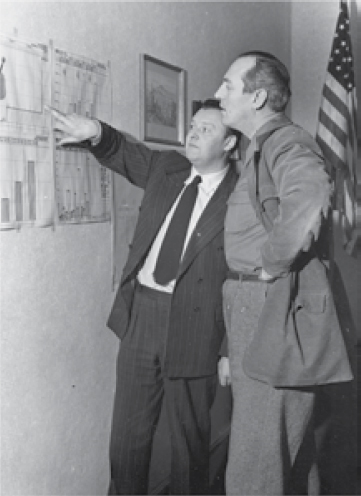
Fred Taylor, RIAS Director from 1949 to 1953, speaks with Albert Psnicker, RIAS Technical Director.

Program Director Ruth Gambke (left) and Deputy Director for Production and Programming Herman Chevalier discuss a change in the broadcast schedule.
ACKNOWLEDGMENTS
This book is about the radio war that occurred in Berlin between America and East Germany during the Cold War. The project would not have been possible without the invaluable assistance of the many colleagues, friends, and family members who assisted me in the research and writing.
First, I am indebted to the archivists who helped guide me through the vast collections of records and documents upon which this book is based: Amy Schmidt at the National Archives; the staff of the Marshall Research Library at the Virginia Military Institute; Ingrid Pietrzynski and Jrg-Uwe Fischer at the Deutsches Rundfunkarchiv; Lydia Kiesling at the Landesarchiv Berlin; Martin Bumgrtel at Deutschlandradio; Andreas Michaelis at the Deutsches Historisches Museum; the staff at the Bundesarchiv in Berlin and Koblenz; Michael Schneider and Barbara Richter at the Archiv fr Sozialdemokratie in Bonn; and the staff of the Dwight D. Eisenhower Presidential Library.
Most of the research for this book was carried out with the support of the Berlin Program for Advanced German and European Studies at the Freie Universitt Berlin. That foundation not only provided me with the funds necessary for conducting research but also afforded me the opportunity to meet and work with a wonderful cohort of scholars. They include Erika Hughes, Michael Meng, Jennifer Miller, J. Griffith Rollefson, Gregory Shealy, and Gregory Witkowski. I am also thankful to many scholars I met during my time in Berlin who provided advice and insightful comments on my work: David Barclay, Gisela Beck, Christoph Classen, Inge Marolek, and Hans-Ulrich Wagner.

